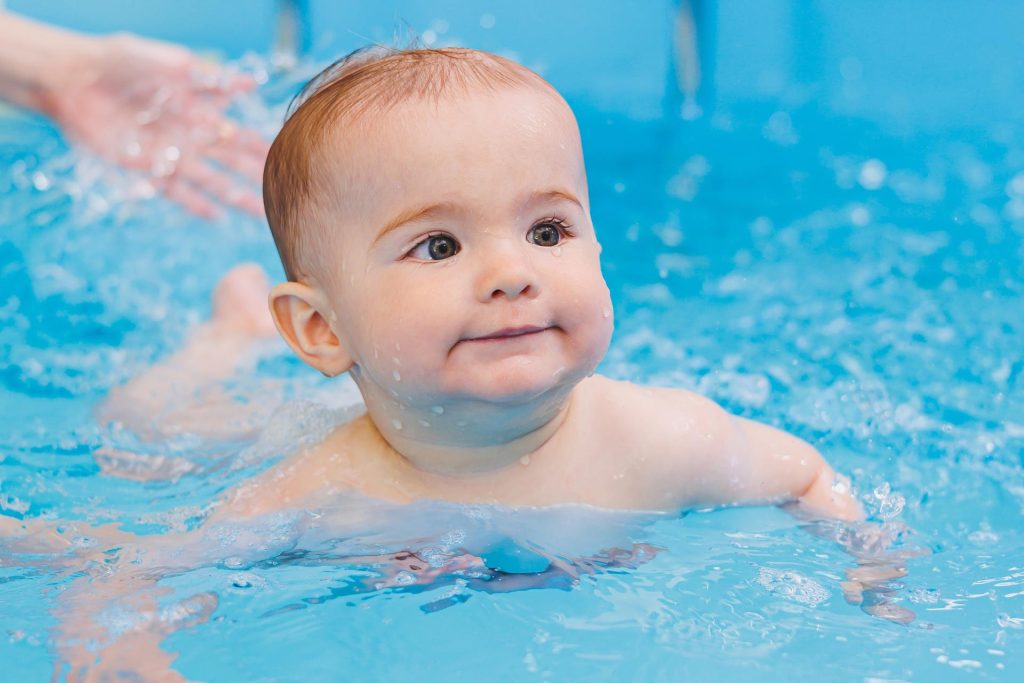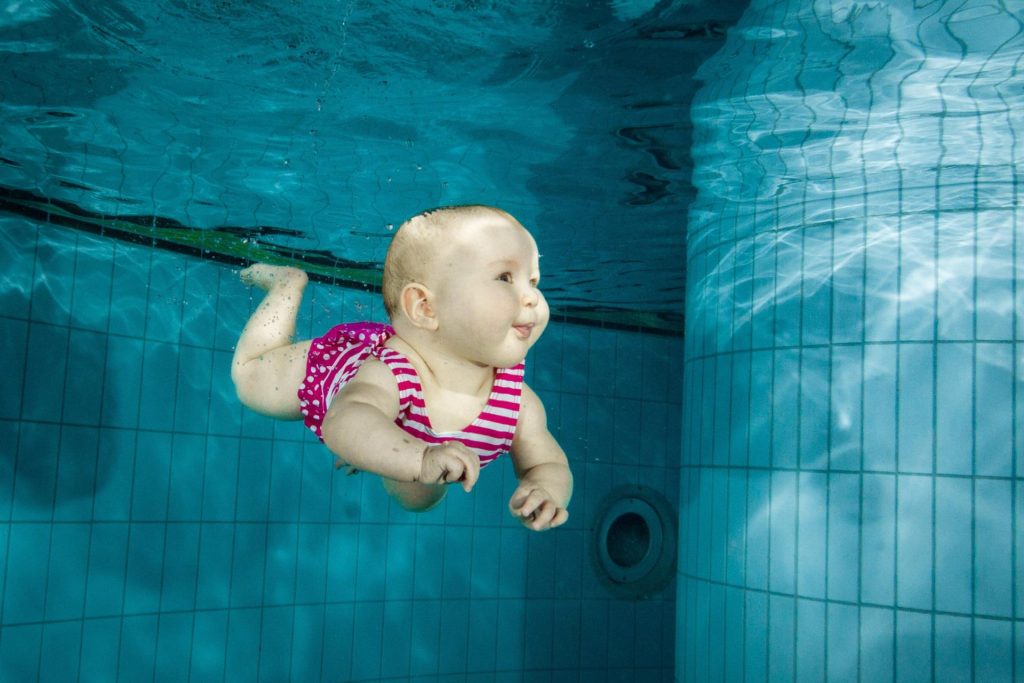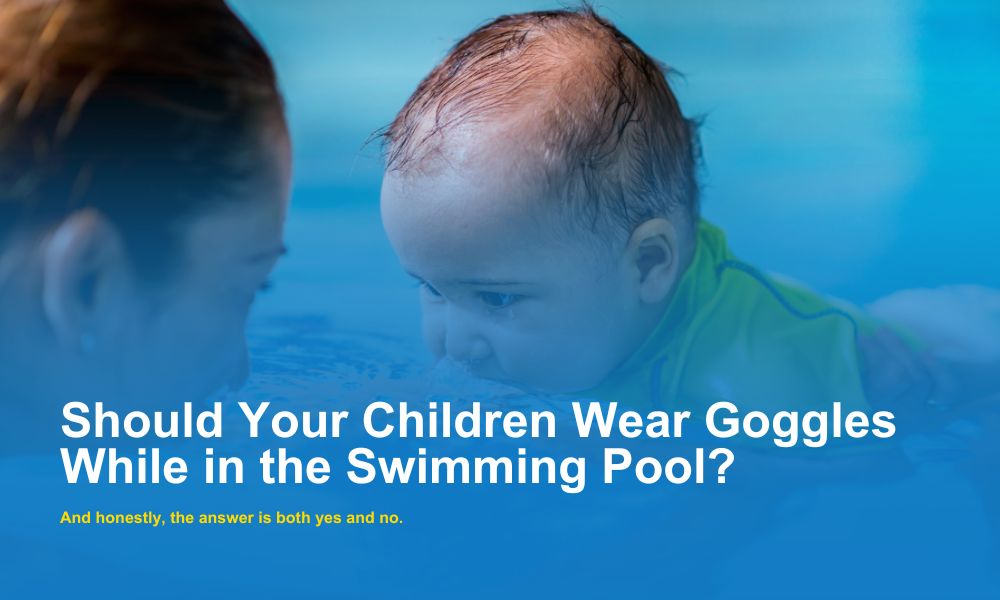This is a question I hear from parents all the time: “Should my child wear goggles while swimming?” And honestly, the answer is no.
Goggles can be a great tool to help your child feel more comfortable and focused in the water, but they’re not something they should rely on all the time.
Let’s talk about why swimming with or without goggles matters and how you can make the best choice for your child.
Why Your Child Needs to Swim Without Goggles
Building Confidence in the Water
Let’s face it – water in the eyes can be uncomfortable. But if your child can learn to handle that sensation, it builds a lot of confidence.
When they know they can swim and open their eyes underwater without needing goggles, they’ll feel more in control and less fearful.
This natural comfort helps them become more adaptable swimmers.

Developing Essential Water Safety Skills
Imagine your child accidentally falls into a pool or a lake and they don’t have goggles on. They need to know how to open their eyes underwater, find their way to safety, and swim without panicking.
This skill is called Personal Aquatic Survival Skills, and it’s essential. If they always wear goggles, they might panic if they’re suddenly in the water without them. Practicing without goggles prepares them for real-life situations.
Fostering Independence
When your child can swim confidently without goggles, they become more independent. They won’t need to rely on gear or worry about whether they have the “right equipment.” Whether they’re at a friend’s pool or a beach, they’ll know they can swim no matter what.
Strengthening Eye Comfort in Water
Swimming without goggles also helps your child’s eyes get used to different water types, like chlorinated pools, saltwater, or freshwater lakes.
This gradual exposure helps reduce discomfort, so they’re not fazed by a little water in their eyes. Over time, this makes swimming more enjoyable, even without goggles.
So… When Might Goggles Be Necessary?
Okay, we’ve talked about why swimming without goggles is important, but there are definitely times when goggles can be a real lifesaver (not literally, but you know what I mean).
When Learning to Swim
If your child is just starting out, goggles can help them focus on learning proper swimming techniques.
Water in the eyes can be distracting for beginners, so goggles can help them concentrate on things like blowing bubbles, floating, and getting their strokes right.
Swimming in Chlorinated or Saltwater Pools
Chlorine and saltwater can be harsh on the eyes, and we don’t want swimming to turn into an uncomfortable experience.
Goggles protect their eyes from irritation, redness, or stinging. This way, they can swim longer and enjoy it more.

Read more: Mineral Pools vs Chlorine Pools: Which one is best for your child?
Competitive Swimming or Underwater Activities
If your child is into competitive swimming or loves underwater games, goggles are pretty much a must. They help with clear vision and let them focus on their technique.
Plus, for activities like diving or retrieving objects from the pool floor, goggles make it way easier to see what they’re doing.
Benefits of Wearing Goggles
So, let’s talk about the perks of wearing goggles. There are a few good reasons why they can be super helpful:
Eye Protection
Goggles protect your child’s eyes from chlorine, salt, and any debris in the water. No one likes red, itchy eyes after a swim, right?
Improved Visibility
When they can see clearly underwater, your child feels more secure. They can spot pool walls, other swimmers, or even just enjoy looking around underwater. It makes swimming more fun and less stressful.
Comfort
Let’s be honest, swimming without water getting in your eyes is just more comfortable. And when kids are comfortable, they’re more likely to practice and enjoy swimming.
Encourages Swimming Practice
If wearing goggles makes swimming more enjoyable, your child will be excited to get in the water and practice. More practice means better skills, and better skills mean more confidence!
The Downsides of Wearing Goggles
While goggles are great, they do come with a few downsides.
The True Story
In 1998, during one of my swim classes, I met a 4 ½-year-old boy named Sam. He swam confidently with goggles, but when I asked him to take them off, he burst into tears. His mother later explained that Sam had never swum without goggles since he was a baby.
His mother shared a frightening story: Sam once jumped into the deep end of their pool to escape his brother. Despite knowing how to swim, he panicked when water got in his eyes because he wasn’t wearing goggles. His panic led him to cling tightly to his brother, and their mother had to jump in to save both boys.
This experience cemented my belief that children need to swim confidently without goggles. Goggles are great aids, but swimming without them is a life-saving skill. I always encourage my students to practice without goggles — because in a real emergency, goggles might not be there to help.
Over-Reliance
Just like floaties or earplugs, goggles can become a crutch. If your child always swims with goggles, they might feel anxious if they have to swim without them.
It’s important to balance swimming with and without goggles so they feel confident either way. If you’re concerned about your child forgetting how to swim after a long break, this balance helps maintain their skills.
Fit and Comfort
Finding the right goggles can be tricky. Too tight, and they leave marks or cause headaches. Too loose, and water leaks in, which can be really frustrating.

Fogging Issues
Goggles fogging up is a classic problem. One minute, your child can see perfectly, and the next, it’s like looking through a cloud. Quick tip: To stop goggles from fogging, try rubbing a tiny bit of baby shampoo on the lenses, then rinse gently. It works like magic!
Read more: Water phobia in babies: How to get over a fear of water?
Trusted Babies Swim School in Queensland
At Shapland Swim School, we know that while goggles have their place, kids shouldn’t rely on them all the time.
Our baby swimming lessons focus on building water confidence without too much gear. With only 3 children per class and over 80 years of experience, we create a safe, supportive environment where your child can thrive.
We help kids develop essential swimming skills, whether they’re wearing goggles or not. Plus, we offer flexible make-up lessons and expert instructors who know how to make learning fun and stress-free.
Want to learn more about how we teach water confidence? Check out these helpful links:
So, Should Your Child Wear Goggles?
At the end of the day, the answer is yes and no. Goggles are great for protection, comfort, and learning, but it’s just as important to help your child feel confident swimming without them.
By mixing it up, you’re setting your child up to be a strong, adaptable swimmer – ready for anything the water brings!
Happy swimming!

